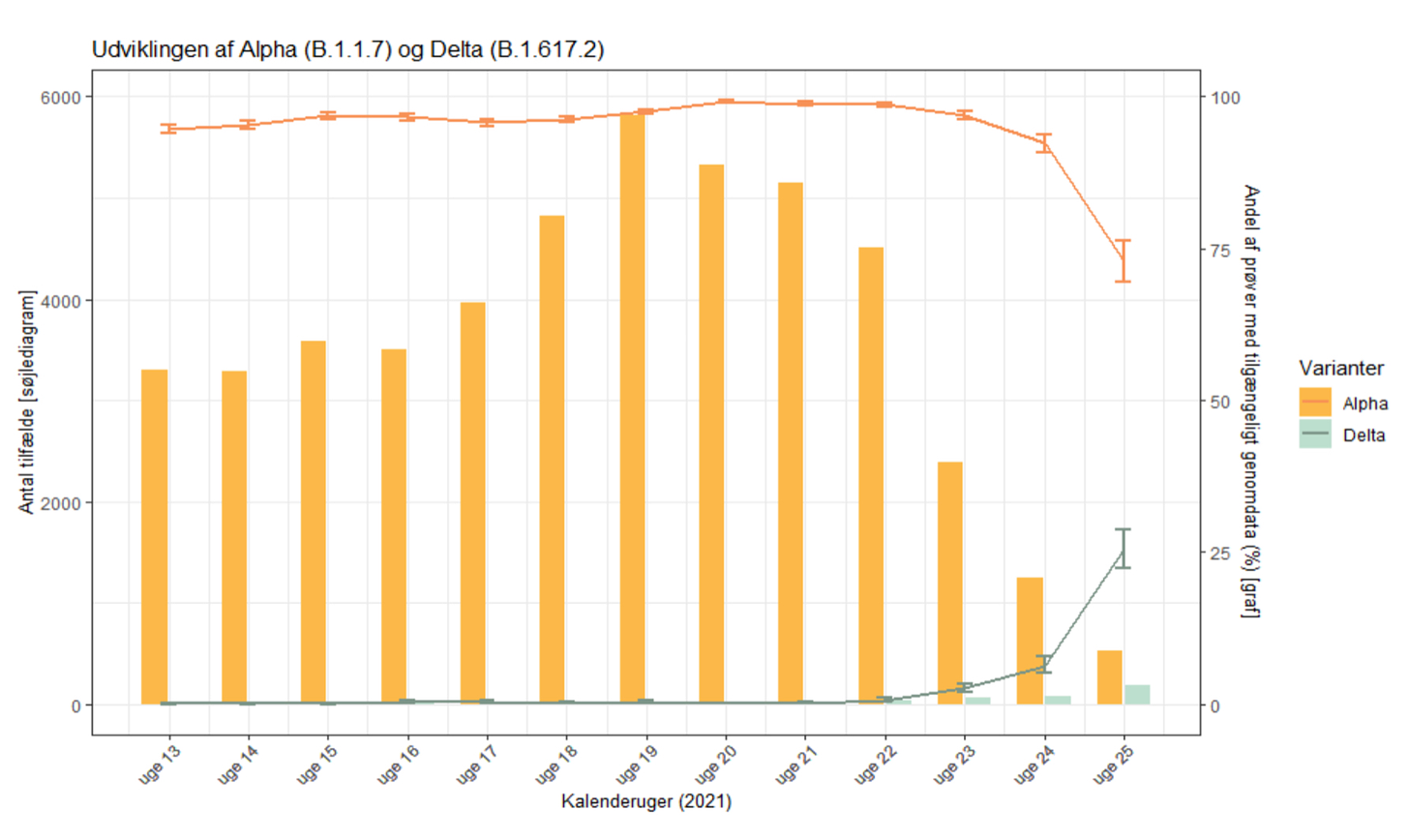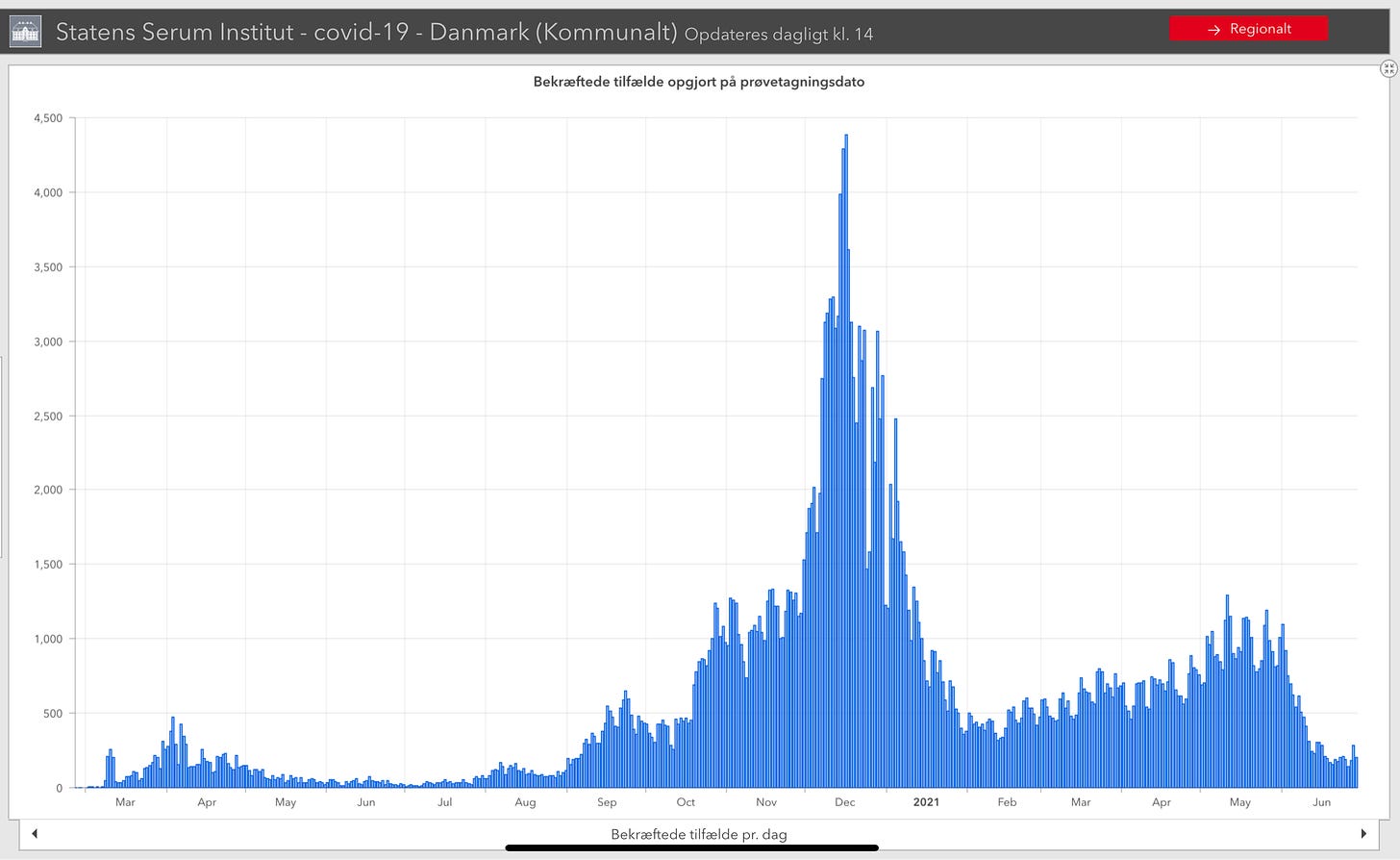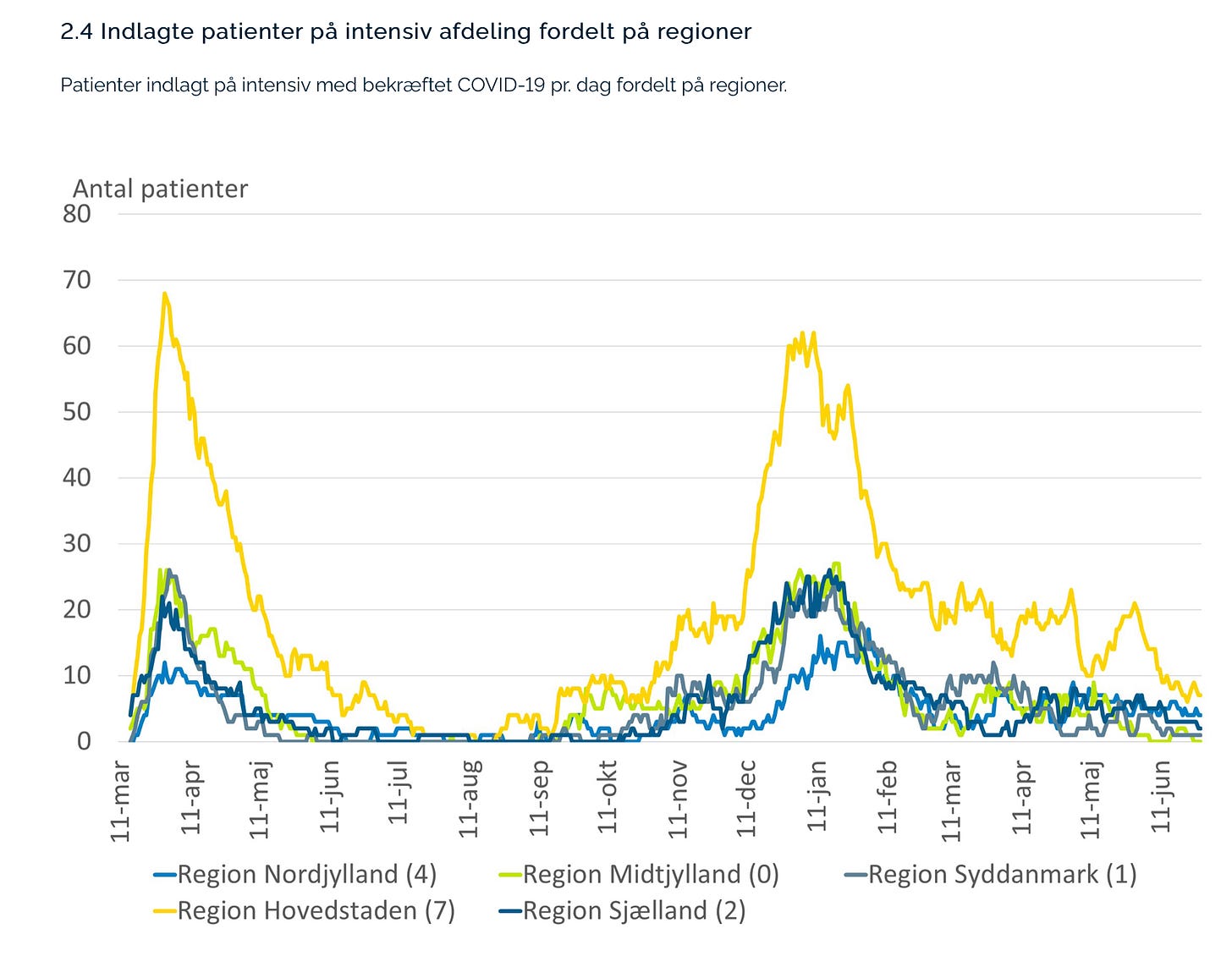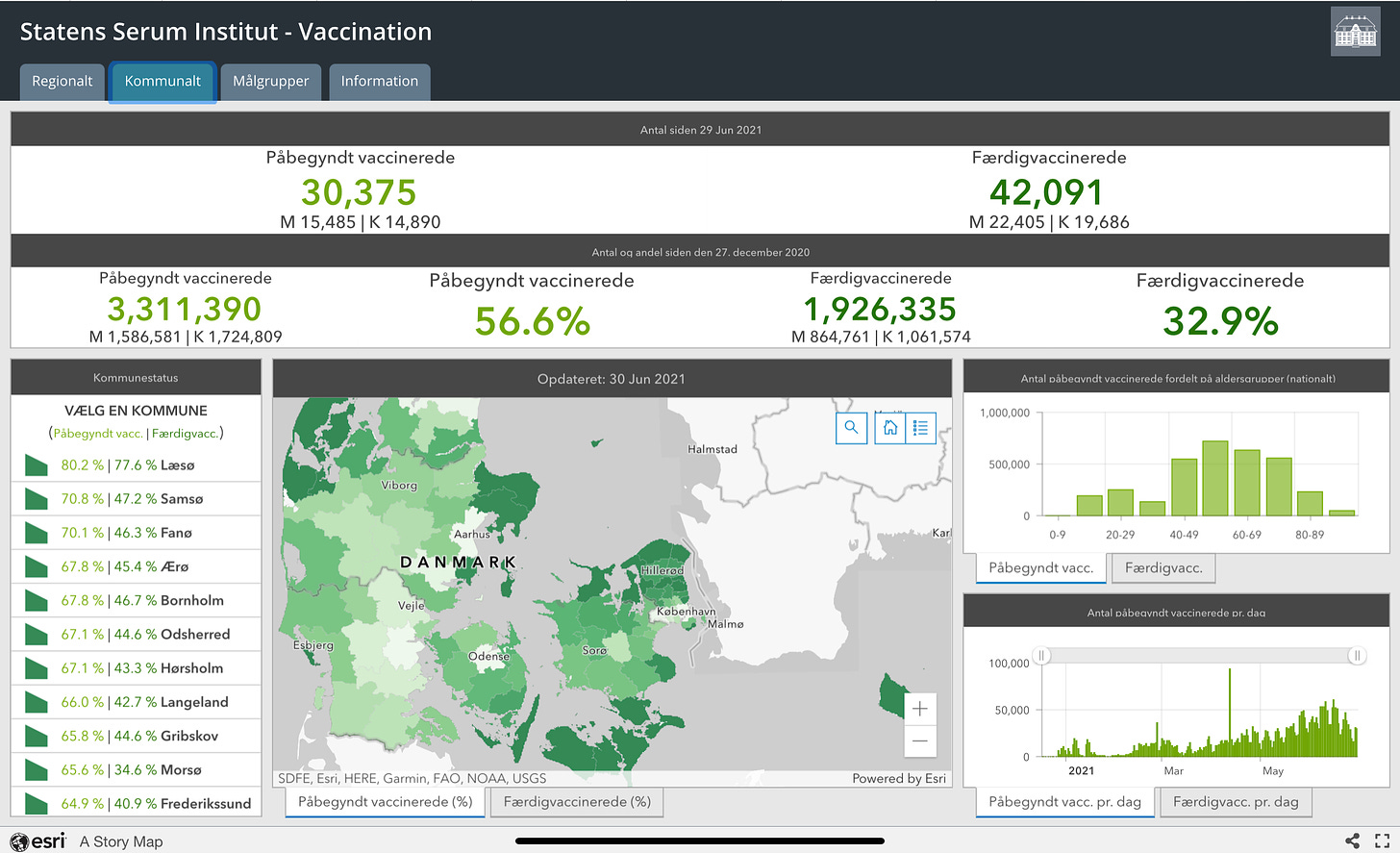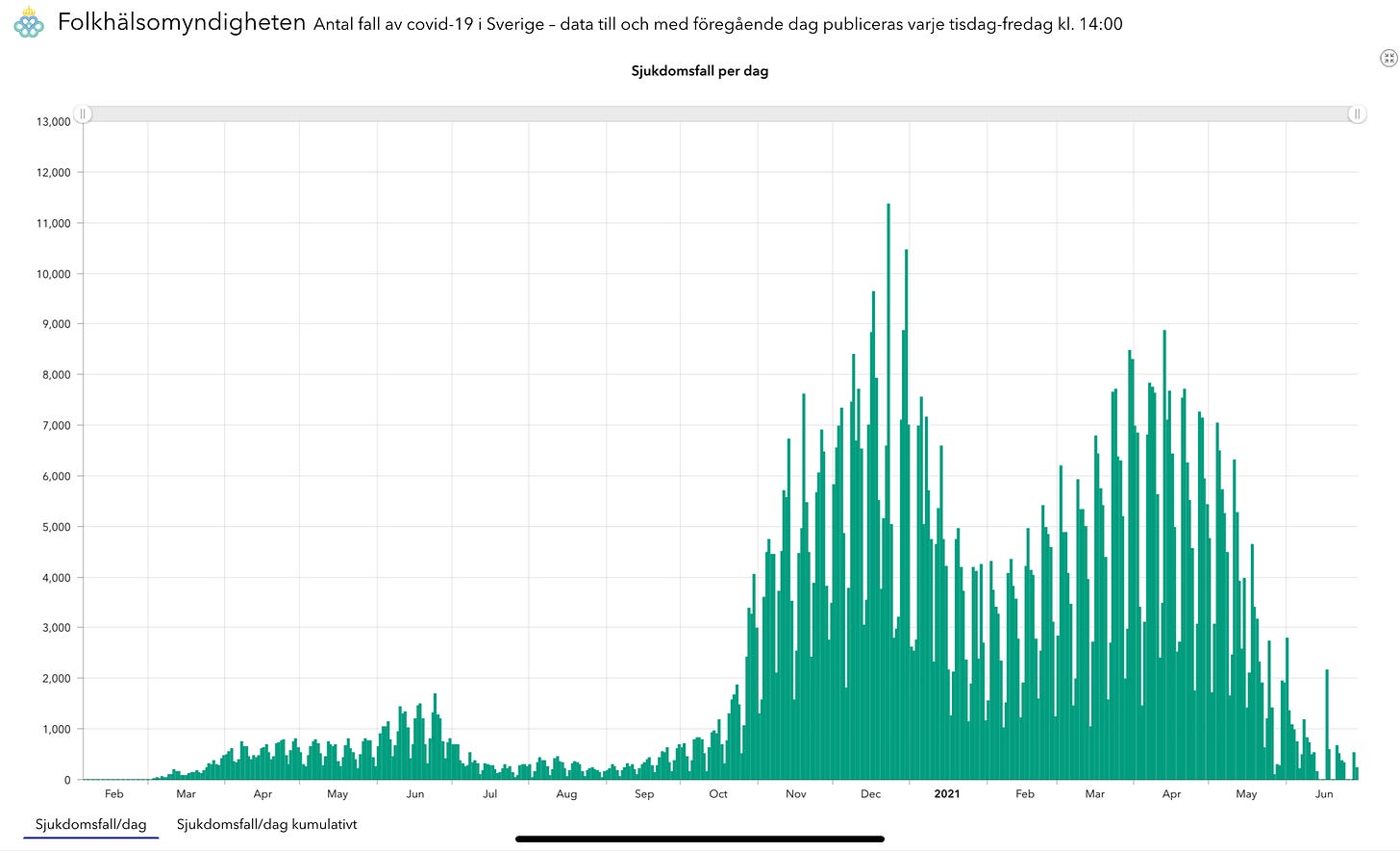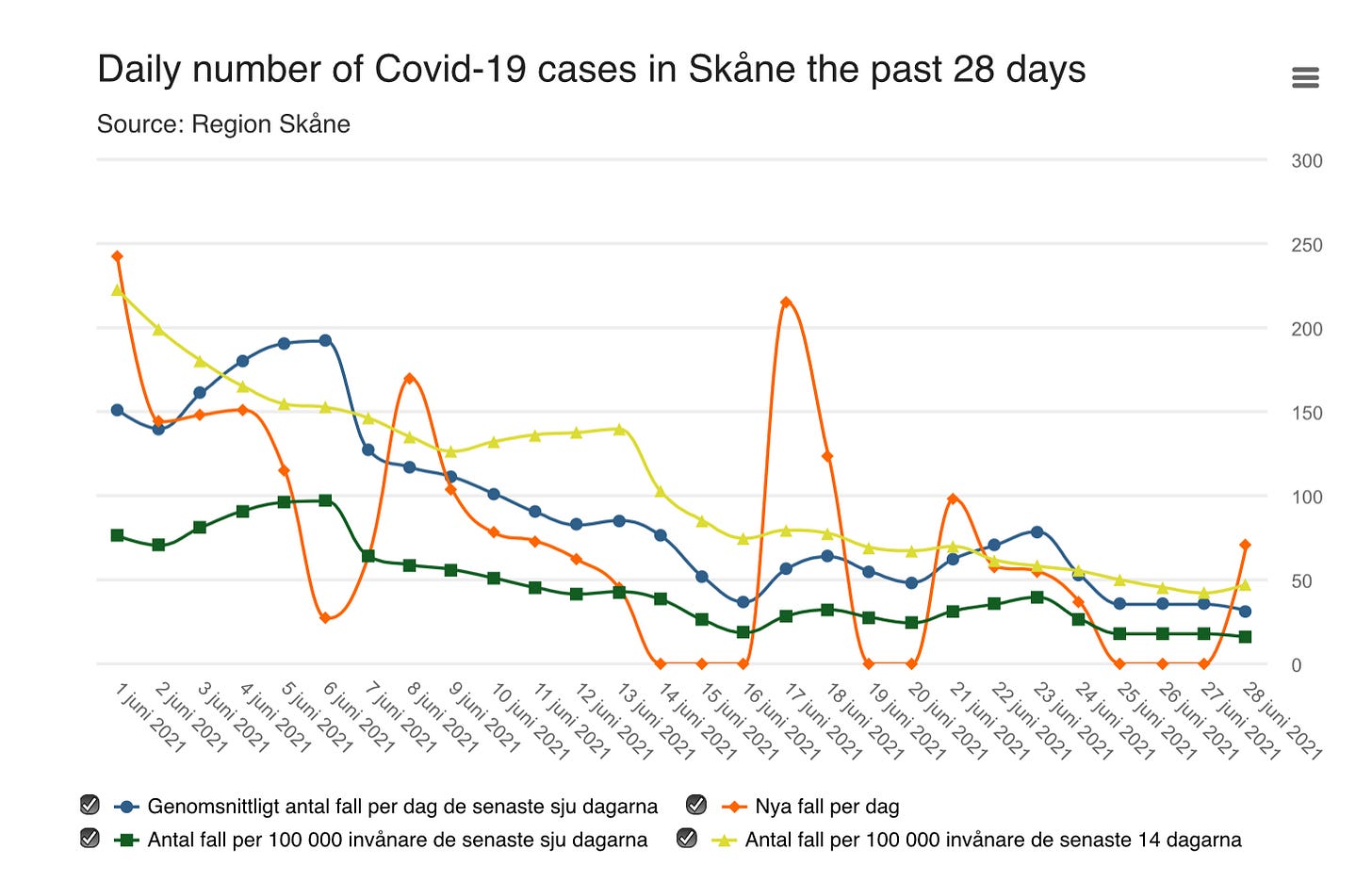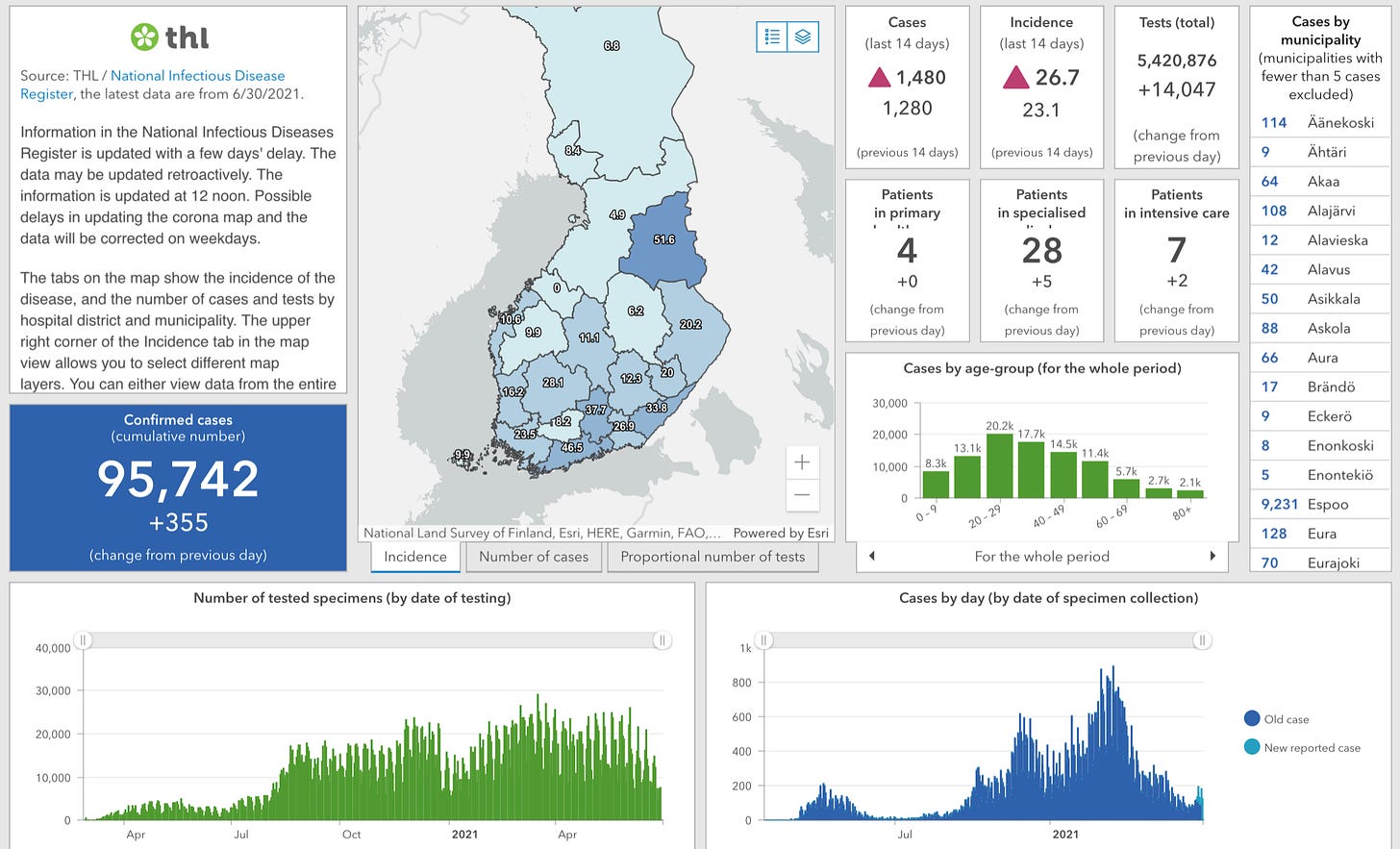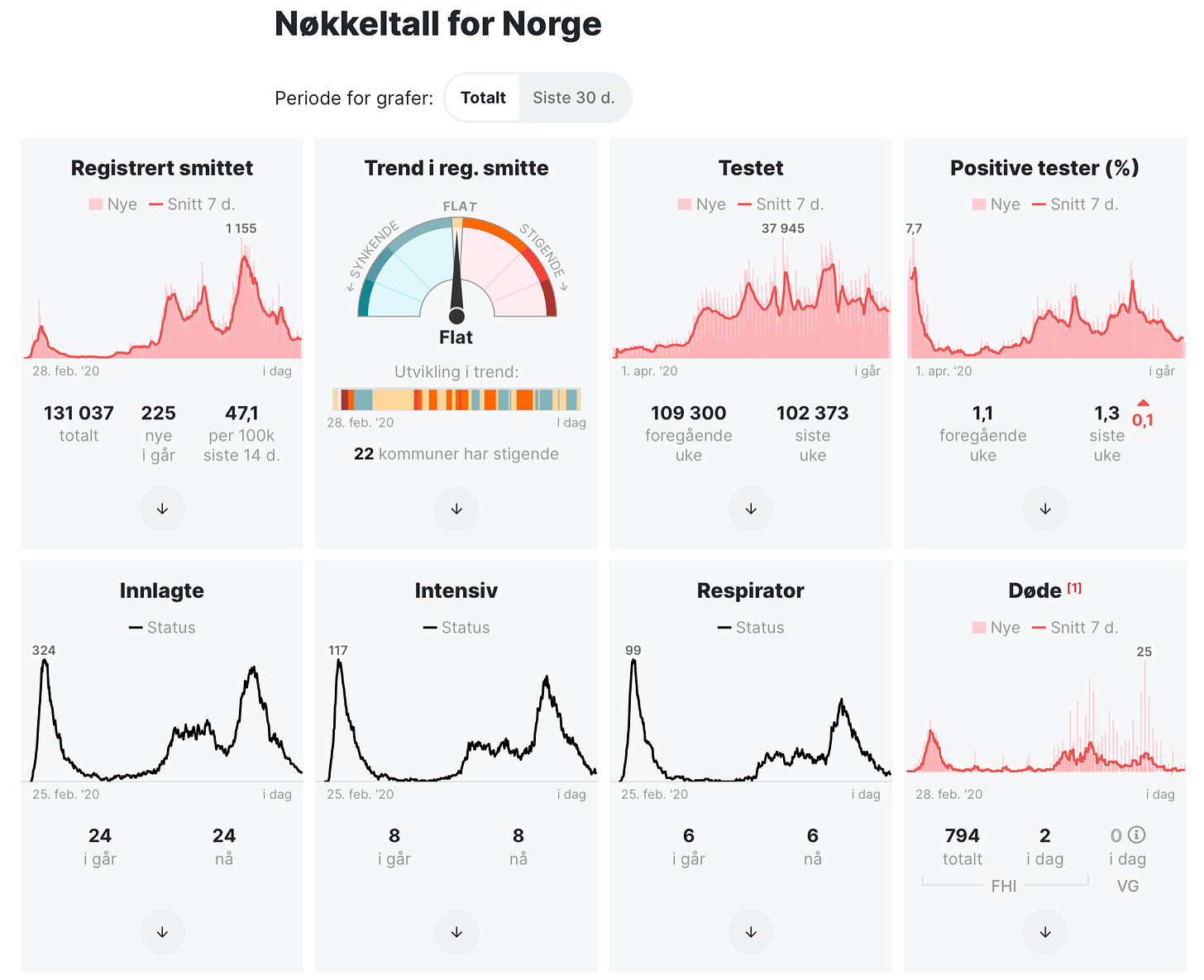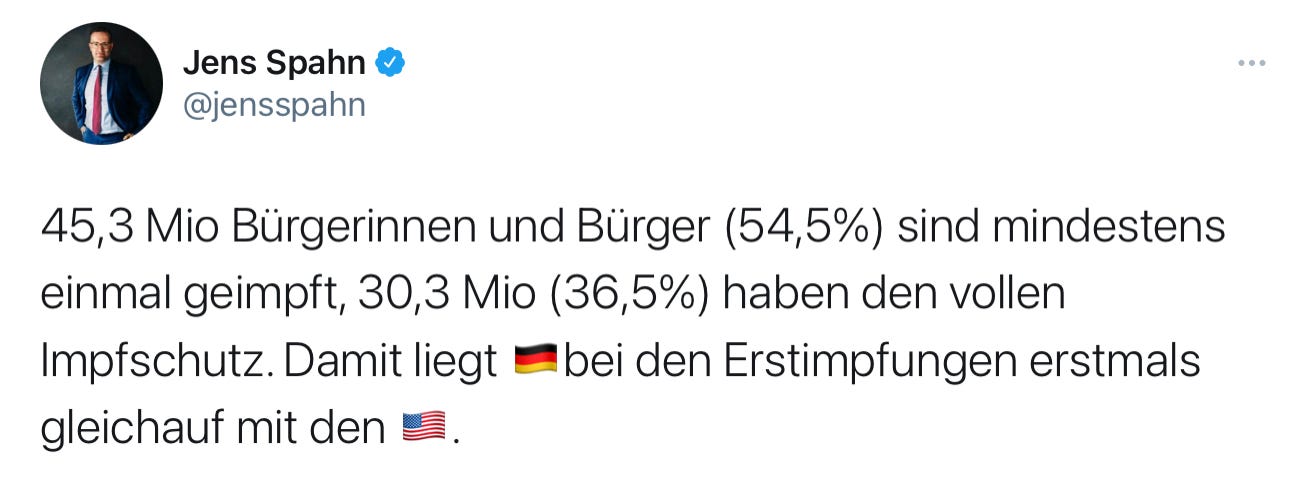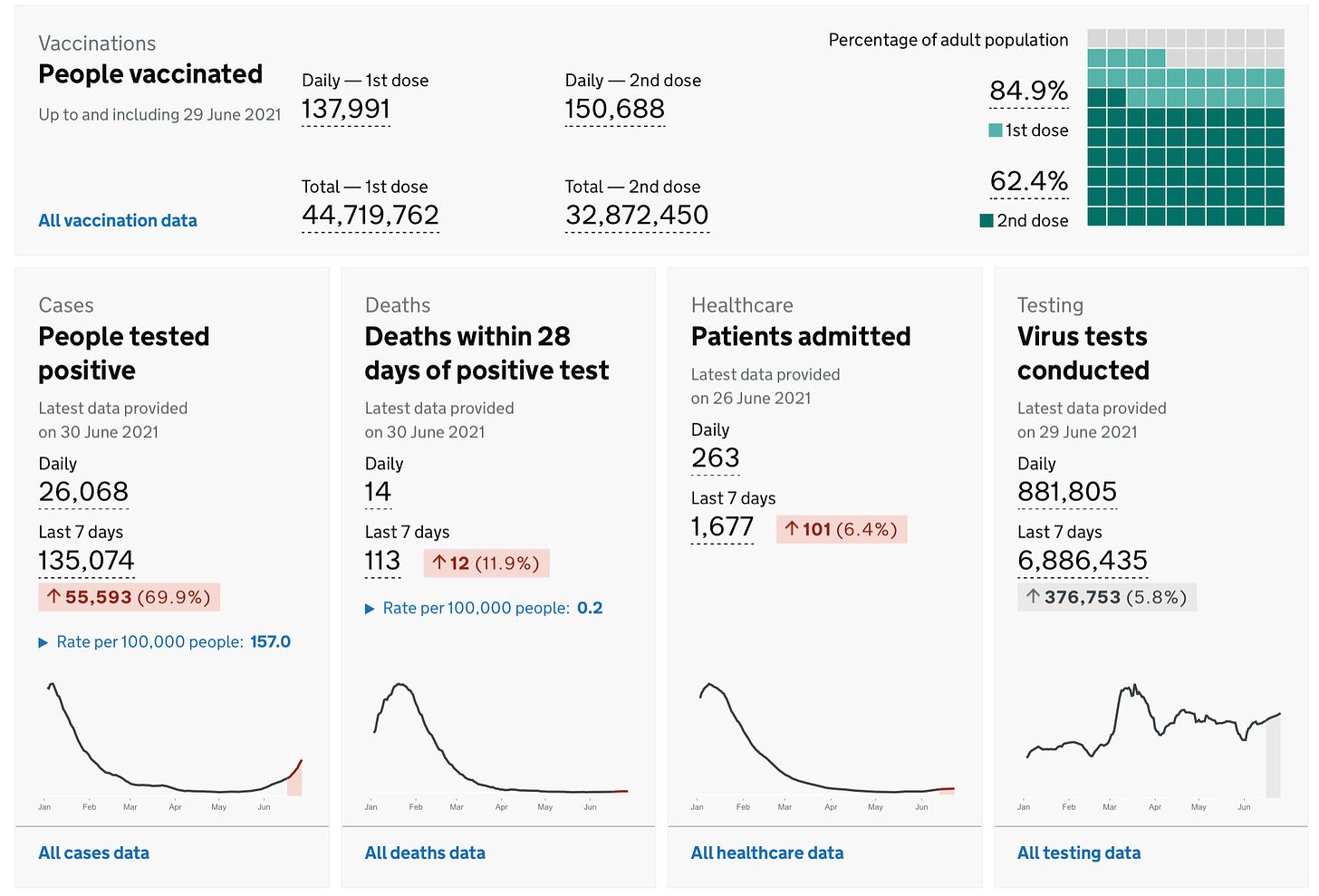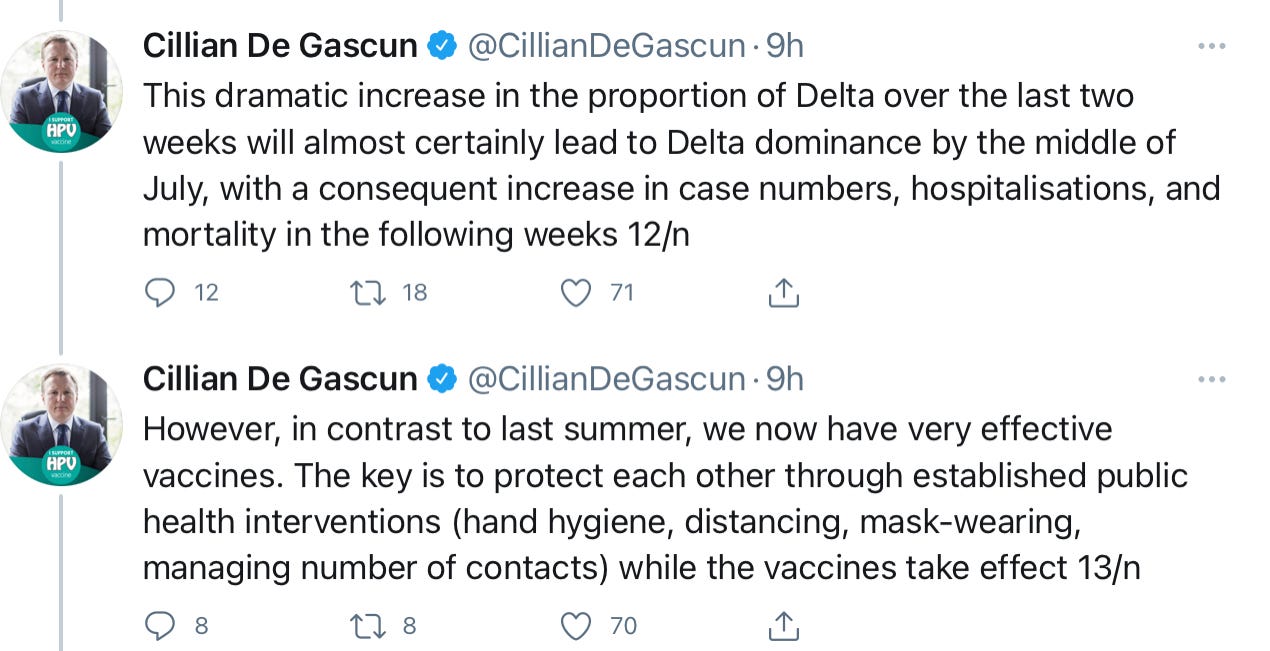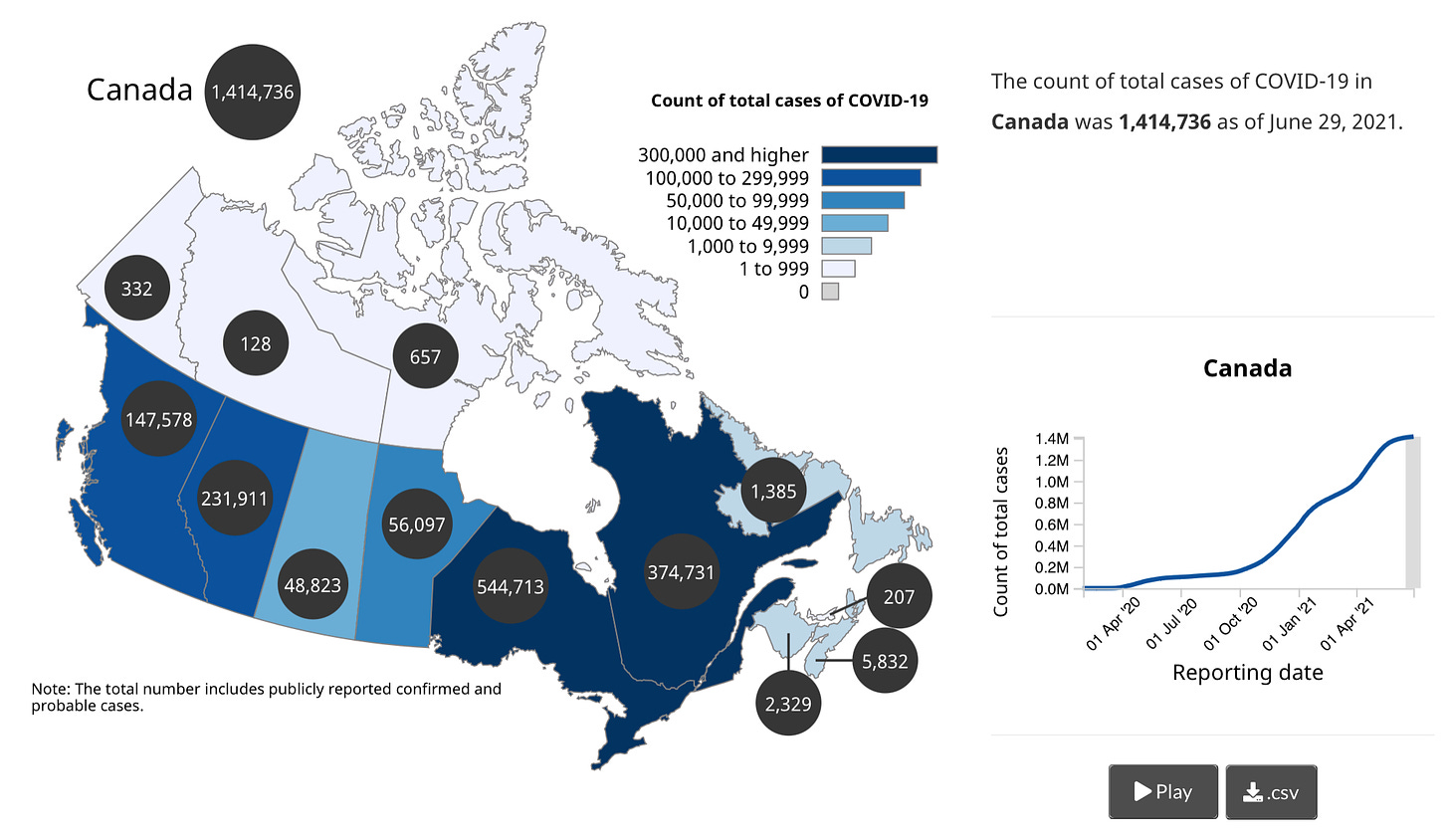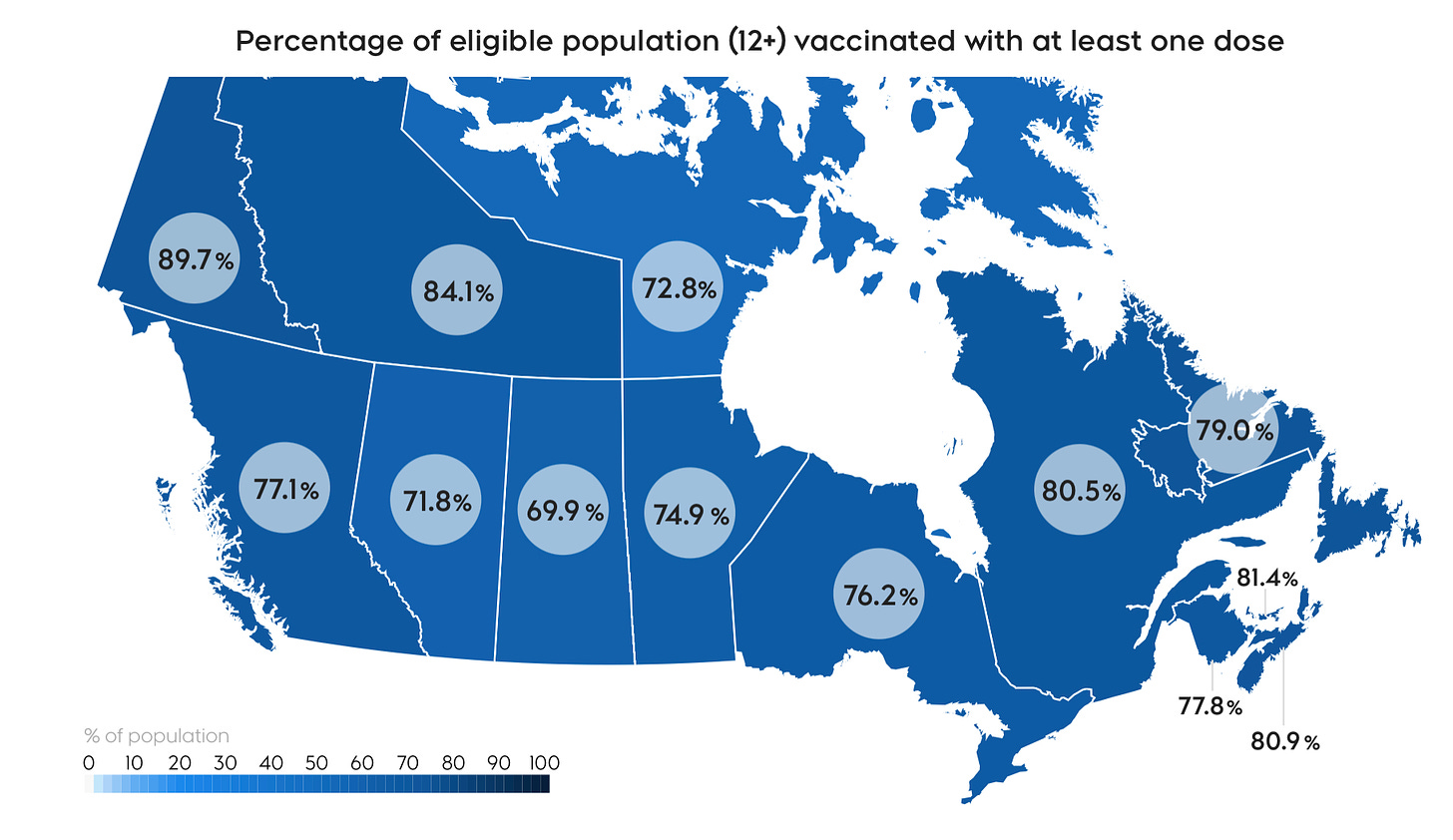🇩🇰
Denmark’s National Health Board has extended the period of immunity for those who have had COVID and for those who are vaccinated. The period a person is assessed to be immune is now extended from eight months to one year.
Unit Manager Bolette Søborg:
“The new studies indicate that the protective immunity after vaccination is even better than after the disease has passed. Our new assessment is therefore that the effect of vaccination is 12 months.”
The change also means any revaccination effort to administer booster shots won’t be necessary until maybe 2022. The health board says it will “continuously assess” whether booster shots are even needed at all.
The immunity change will also be made in the coronapas. It is worth noting our understanding of previous infection and vaccine induced immunity is constantly evolving. As we learn more, things will continue to change, much as it already has from five months immunity to eight, and now one year. Other studies this week have already theorized mRNA vaccine immunity might last a lifetime.
-
As of tomorrow (July 1) most PCR testing centers in Denmark will no longer require an appointment to get tested. As demand falls, the Staten Serum Institut says there is an extra testing capacity that can, and should be used.
TestCenter Denmark Director Anne-Marie Vangsted:
"I would encourage you to use PCR testing for the sake of epidemic surveillance. PCR tests can find virus mutations, and at the same time they are more accurate. In addition, we have had our response times become much quicker now. Over 98% of those tested receive answers no later than the next day, and if you have been tested in the morning, you will often experience getting answers the same day.”
As well, as of July 1 a negative PCR test result will be good for four days, up from the current 72 hours. A negative rapid test result will also be valid for three days from the time of testing.
Not every testcenter will be able to be used without an appointment. You can check the map at coronasmitte.dk to see what rules apply for each testing center.
-
The first shipments of the 1.17 million doses of the Pfizer/BioNTech vaccine Denmark has bought from Romania will fly out Thursday morning. Vaccination centers are already making preparations to step up operations. Region Sjælland expects to double its daily vaccinations. Vaccination manager Bettina Tomczyk told DR they are administering between 8,000 to 9,000 doses a day at the larger centers. She says they are looking to kick that up to a maximum of 16,000 inoculations per day. Tomczyk says they have been told to expect the first of the Pfizer doses by Monday or Tuesday next week.
-
253 students and staff members at Grønnemose School in Søborg have been sent home after a student was confirmed to have COVID. TV2 is reporting that it has been confirmed to Delta variant.
-
The number of Delta variant infections has shot up in the last day. The Staten Serum Institut is reporting 117 new Delta variant infections day to day. That pushes total to-date infections involving the highly infectious variant to 475.
The variant now makes up 25% of all sequenced positive test results. Per the SSI graph below, it is on its way to replacing the Alpha variant as the dominant coronavirus strain in Denmark.
-
The Staten Serum Institut has found a silver lining to the pandemic: far fewer food-borne illnesses. The agency says cases of salmonella and campylobacter bacteria illnesses have dropped significantly Salmonella cases where down by as much as 45% last year, while campylobacter bacteria-related illnesses dropped by 31%.
Epidemiologist Luise Müller says this is due to COVID restrictions and far less travel, resulting in people not returning home with unwanted souvenirs.
"In addition to the changes in Danes' travel patterns and fewer doctor visits that the COVID epidemic has led to, the general coronary restrictions such as the closure of restaurants and canteens have had an effect on the decline in food-borne diseases registered in 2020.”
-
Denmark is reporting 340 COVID infections and three more coronavirus deaths in the last day.
Yesterday, there were 273,884 total corona tests done, 78,728 PCR and 195,156 rapid as demand drops. This equals a (PCR only) positivity percentage of 0.43%.
COVID hospitalizations (55) continue to drop (-7) while the number of infected people in an ICU (12) is also down (-2) of those the number on a respirator (11) edged down as well (-1).
On the vaccination front 3,311,390 1st dose vaccinations (56.6% of the population) have been administered while 1,926,335 people (32.9%) are fully vaccinated.
Yesterday, there were 72,466 total inoculations done.
Confidence in vaccines is rising while skepticism is falling. That is the finding of a follow-up population level survey conducted by the Danish Medicines Agency. The survey found just 18% were skeptical of the COVID vaccines. That is a five-point reduction from the last survey. Respondents were also significantly less worried about serious side effects, with 36% this survey compared to 45% last.
There was a 12-point jump in people who feel they are well informed about coronavirus vaccines. About three out of every four say they have enough information. Also rising up six points is the number of people in Denmark who feel the debate around vaccination has been respectful and informed.
Unit Head Tanja Erichsen:
“It is also really positive that Danes are increasingly experiencing that the debate takes place on an informed basis. This is also reflected in the fact that 75% of the population now experience that they have the information about the vaccines that they need.”
But the survey found people are both overestimating the frequency of severe side effects, while others underestimate the often mild transient impacts.
“We are facing the need to vaccinate the younger part of the population, where again in the new population survey we can see that almost half of this group also underestimates the occurrence of mild side effects. The younger population is known to have a stronger immune system that can react more forcibly to the vaccine. That is why we also go out on social media in particular and talk about side effects such as fatigue, fever, headaches, and soreness at the injection site, which you do not have to be nervous about.”
Commonly expected side effects don’t show up for everyone. When they do, it means the vaccine is working. The agency stresses they usually go away after a day or two.
-
The Danish National Health Board is easing COVID guidelines in healthcare facilities and hospitals.
Unit Manager Bolette Søborg:
"We are at a point in the epidemic now where more people have been vaccinated, infection rates are low and healthcare staff have solid experience in handling COVID. It must also be reflected in the guidelines. We are gradually returning to a healthcare system where there is no need for the same level of screening for new infections in people without symptoms. We continue to recommend that you be tested if you are a close contact, have symptoms that may be COVID, or there are outbreaks in the healthcare system.”
Among the new guidelines, it is recommended that testing frequency be relaxed for those who are fully vaccinated or who have had a previous infection in the past 12 months. For example, healthcare staff or patients would only be tested if they have symptoms and not as a general screening tool.
🇸🇪
Sweden has added 247 infections and another three corona deaths since yesterday’s update. The usual caveats of a reporting lag continue to apply.
To date 4,749,296 1st doses (58% of the population) and 3,040,488 2nd vaccine doses (37.1%) have been administered.
-
New infections in Southern Sweden seem to be trending upward, per the latest update from Region Skåne. But the number of new cases looks low and the longer-term trend line appears to be a little more static.
The region has so far administered 601,284 1st doses (54.7% of the population while 375,028 people (34.1%) are fully vaccinated.
🇫🇮
For the first time in weeks, Finland’s infection numbers are rising. It registered 355 new infections today, the highest daily number of new coronavirus cases since April 13. In the last seven days, there has been one new coronavirus death.
1,480 infections have been reported in the last two weeks, which is 200 more than in the previous two weeks.
COVID hospitalizations (31) are up over the last week (+3) while those in an ICU (7) also crept up (+2).
To date, 3,251,600 1st dose vaccinations (58.3% of the population) have been done while 996,479 people (17.9%) have had both doses.
-
As Finland struggles with increasing infections due to the super-spreader football game in St. Petersburg, Russia, last week, the country’s police are issuing a plea. They are asking anyone who attended the St. Petersburg European Championship game to stay away from sporting events in Finland beginning with the Helsinki derby, a classic football rivalry set for tonight. About 5,000 spectators are expected to attend the game and authorities are concerned about it exacerbating the current infection fiasco.
-
The Finnish National Advisory Committee on Vaccines is urging health authorities to acquire or set aside vaccine doses to make sure there are enough to vaccinate children and for booster shots for high-risk groups. According to YLE, the group also wants authorities to make sure there will be vaccine doses ready to go, if booster shots are needed beginning this fall.
🇳🇴
Norway has added 125 infections and two more virus deaths since yesterday’s update.
COVID hospitalizations (24) ICU numbers (8) and ventilator numbers (6) are all unchanged.
To date 47.16% of Norwegians have had one vaccine dose and 28.71% have had both.
-
The Norwegian Institute for Public Health is citing a study out of the UK that, like other studies from Spain and Germany, has found combining AstraZeneca and Pfizer offers good protection. The latest study found that having a first dose of AstraZeneca and then a second dose of Pfizer offers the same level of protection against COVID as does two doses of an mRNA vaccine.
NIPH Chief Physician Sara Viksmoen Watle:
“It is gratifying to see that the studies confirm what we have previously assumed. This indicates that those who have received this combination will have as good protection against covid-19 as those who have received two doses of the mRNA vaccine.”
The combination of the two vaccines also produced almost 10 times higher antibody levels than after two doses of the AstraZeneca vaccine.
Norway has about 135,000 people who had AstraZeneca as a first dose. Most of them were healthcare workers. The institute says second-dose vaccinations switching to an mRNA vaccine are about 90% done.
🇩🇪
Germany Health Minister Jens Spahn says the US vaccination campaign may have raced out of the gates, but the steady German effort has now caught up. Spahn says Germany and the United States are now equal for first doses administered as a percentage of the population. He says “that shows the vaccination campaign needs staying power.”
To date, 45.3 million people in Germany (54.5% of the population) have had one dose while 30.3 million (36.5%) have had both doses. Spahn adds “given the Delta variant, it is important as many people as possible get vaccinated!”
🇬🇧
Today the UK reported its highest number of new COVID infections since January 29, with 26,068 new cases, along with 14 more corona deaths. The number of infections, hospitalizations, and fatalities continue to increase as the struggle with the Delta variant continues.
🇮🇪
The Director of Ireland’s National Virus Reference Laboratory is warning about the impacts of the Delta variant. In a thread on Twitter, Cilian De Gascum says B.1.617.2 appears to be 40% to 60% more contagious than the Alpha variant, based on all available evidence. To put that into context, he says, that makes the Delta variant twice as transmissible as the original coronavirus that swept around the world last spring and summer.
De Gascum says the Delta variant has an increased growth rate, increased secondary attack rate, increased household transmission, and increased replication in laboratory biological systems that model the human airway. So its much more contagious and spreads much faster than any variant we have seen yet to people in contact with an infected person, especially if they are indoors.
He is also concerned about the variant causing more hospitalizations. De Gascum says data from Scotland and England show that “infections with Delta roughly doubled the risk of hospitalization.”
On the immunity front, he notes while there is a reduction in neutralization against Delta “this does not (yet at least) appear to be associated with an increase in reinfections among recovered individuals.” He reiterates the findings of several studies that one vaccine dose is less effective against the variant, but protection stays high after two.
He is warning that, like we have seen in the UK and will soon see in Europe, that the Delta variant will be the dominant strain in Ireland by as early as mid-July.
🏴
Public Health Scotland, in a report issued today, said the Delta variant is now the dominant strain in the country.
It also noted a major infection concern with EURO 2020 games, events, and associated parties. Data from contact tracing found 1,991 Scottish residents who had tested positive had attended one or more EURO 2020 events while they were infectious. This includes games at Wembley Stadium, the fan zone in Glasgow, or gatherings at pubs or house parties to catch a game.
PHS says nine of every ten cases were men. About three-quarters were between 20 and 39 years old. Almost two-thirds had traveled to London for EURO 2020 event including 397 who attended the Scotland versus England game at Wembley Stadium.
🇨🇦
Canada has reported 602 new infections and suffered another 34 coronavirus deaths yesterday.
The Canadian vaccination campaign has so far administered 25,699,502 1st doses (67.50% of the population) while 11,467,583 people (30.12%) now have both vaccine doses.
Today in Ontario saw the lowest number of new infections since last September with 184 infections and another 14 deaths. The province began the next phase of its reopening today as well.
Quebec reported 126 infections and another three fatalities.
In Atlantic Canada, New Brunswick logged three new infections. Newfoundland and Labrador had one. Nova Scotia saw
Manitoba saw 61 new infections and no lives lost yesterday.
There were 52 infections and two more corona deaths in Saskatchewan yesterday.
Alberta registered 61 infections and four deaths as it sees the lowest hospitalization numbers since last summer.
B.C. recorded 29 infections and no new deaths yesterday. Tomorrow it will move into the next phase of its reopening, which includes lifting the mask mandate.




